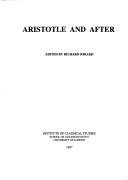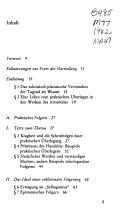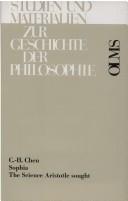| Listing 1 - 10 of 768 | << page >> |
Sort by
|
Book
ISBN: 9788845271540 Year: 2012 Publisher: Milano Bompiani
Abstract | Keywords | Export | Availability | Bookmark
 Loading...
Loading...Choose an application
- Reference Manager
- EndNote
- RefWorks (Direct export to RefWorks)
Aristoteles. --- Aristoteles --- Aristote --- Aristotle --- Arisṭāṭṭil --- Aristo, --- Aristotel --- Aristotele --- Aristóteles, --- Aristòtil --- Aristotile --- Arisṭū --- Arisṭūṭālīs --- Arisutoteresu --- Arystoteles --- Ya-li-shih-to-te --- Ya-li-ssu-to-te --- Yalishiduode --- Yalisiduode --- Ἀριστοτέλης --- Αριστοτέλης --- Аристотел --- ארסטו --- אריםטו --- אריסטו --- אריסטוטלס --- אריסטוטלוס --- אריסטוטליס --- أرسطاطاليس --- أرسططاليس --- أرسطو --- أرسطوطالس --- أرسطوطاليس --- ابن رشد --- اريسطو --- Pseudo Aristotele --- Pseudo-Aristotle --- アリストテレス
Book
ISBN: 9004282580 9789004282582 9789004274389 9004274383 1322309663 Year: 2014 Publisher: Boston
Abstract | Keywords | Export | Availability | Bookmark
 Loading...
Loading...Choose an application
- Reference Manager
- EndNote
- RefWorks (Direct export to RefWorks)
New investigations on the content, impact, and criticism of Aristotelianism in Antiquity, the Late Middle Ages, and modern ethics show that Aristotelianism is not an obsolete monolithic doctrine but a living and evolving tradition within philosophy. Modern philosophy and science are sometimes understood as anti-Aristotelian, and Early Modern philosophers often conceived their philosophical project as opposing medieval Aristotelianism. New Perspectives on Aristotelianism and Its Critics brings to light the inner complexity of these simplified oppositions by analysing Aristotle’s philosophy, the Aristotelian tradition, and criticism towards it within three topics – knowledge, rights, and the good life – in ancient, medieval, and modern philosophy. It explores the resources of Aristotle’s philosophy for breaking through some central impasses and simplified dichotomies of the philosophy of our time. Contributors are: John Drummond, Sabine Föllinger, Hallvard Fossheim, Sara Heinämaa, Roberto Lambertini, Virpi Mäkinen, Fred D. Miller, Diana Quarantotto, and Miira Tuominen.
Aristotle. --- Aristoteles --- Aristote --- Aristotle --- Arisṭāṭṭil --- Aristo, --- Aristotel --- Aristotele --- Aristóteles, --- Aristòtil --- Aristotile --- Arisṭū --- Arisṭūṭālīs --- Arisutoteresu --- Arystoteles --- Ya-li-shih-to-te --- Ya-li-ssu-to-te --- Yalishiduode --- Yalisiduode --- Ἀριστοτέλης --- Αριστοτέλης --- Аристотел --- ארסטו --- אריםטו --- אריסטו --- אריסטוטלס --- אריסטוטלוס --- אריסטוטליס --- أرسطاطاليس --- أرسططاليس --- أرسطو --- أرسطوطالس --- أرسطوطاليس --- ابن رشد --- اريسطو --- Pseudo Aristotele --- Pseudo-Aristotle --- アリストテレス
Book
ISBN: 9780826497079 9780826497086 Year: 2011 Publisher: London Continuum
Abstract | Keywords | Export | Availability | Bookmark
 Loading...
Loading...Choose an application
- Reference Manager
- EndNote
- RefWorks (Direct export to RefWorks)
Aristotle --- Aristoteles. --- Aristoteles --- Aristote --- Arisṭāṭṭil --- Aristo, --- Aristotel --- Aristotele --- Aristóteles, --- Aristòtil --- Aristotile --- Arisṭū --- Arisṭūṭālīs --- Arisutoteresu --- Arystoteles --- Ya-li-shih-to-te --- Ya-li-ssu-to-te --- Yalishiduode --- Yalisiduode --- Ἀριστοτέλης --- Αριστοτέλης --- Аристотел --- ארסטו --- אריםטו --- אריסטו --- אריסטוטלס --- אריסטוטלוס --- אריסטוטליס --- أرسطاطاليس --- أرسططاليس --- أرسطو --- أرسطوطالس --- أرسطوطاليس --- ابن رشد --- اريسطو --- Pseudo Aristotele --- Pseudo-Aristotle --- アリストテレス
Book
Abstract | Keywords | Export | Availability | Bookmark
 Loading...
Loading...Choose an application
- Reference Manager
- EndNote
- RefWorks (Direct export to RefWorks)
La "Rhetorica ad Alexandrum" è l'unico testo conservato integralmente all'interno di una vasta produzione di 'technai rhetorikai', cui fanno più volte accenno sia Platone sia Aristotele, e il primo di una serie di trattati sistematici, di manuali pratici, in Grecia e a Roma. La sua lettura apre uno spiraglio di osservazione sulla vita sociale e politica, sul diritto greco, sulla retorica e sull'eloquenza nello stadio intermedio fra i primi retori e Aristotele. Nel trattato si dà rilievo alle potenzialità dell'argomentazione, volta ad assicurare la vittoria all'oratore: oltre che come mezzo di persuasione, la retorica si configura essenzialmente come teoria della comunicazione linguistica nello spazio costituito e controllato della polis, in cui si assegna istituzionalmente un ruolo preminente alla parola 'pubblica', che traduce in dibattito i possibili conflitti, sia privati sia pubblici. L'opera fa parte del "Corpus Aristotelicum" ed è collocabile nel IV secolo a.C, escluse alcune sezioni. La paternità aristotelica è stata messa in dubbio in epoca moderna: alcuni commentatori ed editori hanno attribuito il trattato ad Anassimene di Lampsaco, storico e retore del TV secolo a.C. Alla sua conoscenza e alla sua diffusione, a partire dal Quattrocento, ha contribuito la traduzione latina di Francesco Filelfo.
Aristoteles --- Aristote --- Aristotle --- Arisṭāṭṭil --- Aristo, --- Aristotel --- Aristotele --- Aristóteles, --- Aristòtil --- Aristotile --- Arisṭū --- Arisṭūṭālīs --- Arisutoteresu --- Arystoteles --- Ya-li-shih-to-te --- Ya-li-ssu-to-te --- Yalishiduode --- Yalisiduode --- Ἀριστοτέλης --- Αριστοτέλης --- Аристотел --- ארסטו --- אריםטו --- אריסטו --- אריסטוטלס --- אריסטוטלוס --- אריסטוטליס --- أرسطاطاليس --- أرسططاليس --- أرسطو --- أرسطوطالس --- أرسطوطاليس --- ابن رشد --- اريسطو --- Pseudo Aristotele --- Pseudo-Aristotle --- アリストテレス

ISBN: 0900587792 9780900587795 Year: 1997 Volume: 68 Publisher: London University of London
Abstract | Keywords | Export | Availability | Bookmark
 Loading...
Loading...Choose an application
- Reference Manager
- EndNote
- RefWorks (Direct export to RefWorks)
Aristotle --- Philosophy, Ancient --- Stoics --- Ethics --- Ancient philosophy --- Greek philosophy --- Philosophy, Greek --- Philosophy, Roman --- Roman philosophy --- Aristoteles. --- Aristoteles --- Aristote --- Aristotile --- Arisṭāṭṭil --- Aristo, --- Aristotel --- Aristotele --- Aristóteles, --- Aristòtil --- Arisṭū --- Arisṭūṭālīs --- Arisutoteresu --- Arystoteles --- Ya-li-shih-to-te --- Ya-li-ssu-to-te --- Yalishiduode --- Yalisiduode --- Ἀριστοτέλης --- Αριστοτέλης --- Аристотел --- ארסטו --- אריםטו --- אריסטו --- אריסטוטלס --- אריסטוטלוס --- אריסטוטליס --- أرسطاطاليس --- أرسططاليس --- أرسطو --- أرسطوطالس --- أرسطوطاليس --- ابن رشد --- اريسطو --- Pseudo Aristotele --- Pseudo-Aristotle --- アリストテレス --- Philosophy, Ancient - Congresses. --- Stoics - Congresses.
Book
ISBN: 9789042921948 9782758400653 9042921943 2758400650 Year: 2010 Volume: *1 Publisher: Louvain-la-Neuve Peeters
Abstract | Keywords | Export | Availability | Bookmark
 Loading...
Loading...Choose an application
- Reference Manager
- EndNote
- RefWorks (Direct export to RefWorks)
In this book the most important aristotelian passages concerning the question of determinism are thoroughly reexamined: chapter 9 of de interpretatione, chapter 3 of Metaphysics's book VI, several chapters from the Ethics, as well as some texts from the aristotelian commentator Alexander of Aphrodisias. This is the author's main contention: "In Aristotle's view the world of social relations and of human behaviours really is always highly undetermined; but this is mainly due to the unpredictable intersections of the different causal series issuing from each agent involved, while in each of these series at least one element tends to remain constant (indeed, it is the most stable element in every situation): the personal character of the human agent and the kind of response this character offers to the new situations that constantly arise".
Aristotle --- Determinism (Philosophy) --- Déterminisme (Philosophie) --- Aristotle. --- Déterminisme (Philosophie) --- Philosophy --- History --- Aristoteles --- Aristote --- Aristotile --- Aristoteles. --- Arisṭāṭṭil --- Aristo, --- Aristotel --- Aristotele --- Aristóteles, --- Aristòtil --- Arisṭū --- Arisṭūṭālīs --- Arisutoteresu --- Arystoteles --- Ya-li-shih-to-te --- Ya-li-ssu-to-te --- Yalishiduode --- Yalisiduode --- Ἀριστοτέλης --- Αριστοτέλης --- Аристотел --- ארסטו --- אריםטו --- אריסטו --- אריסטוטלס --- אריסטוטלוס --- אריסטוטליס --- أرسطاطاليس --- أرسططاليس --- أرسطو --- أرسطوطالس --- أرسطوطاليس --- ابن رشد --- اريسطو --- Pseudo Aristotele --- Pseudo-Aristotle --- アリストテレス
Book
ISBN: 9780691096537 Year: 2013 Publisher: Princeton, N.J. Princeton University Press
Abstract | Keywords | Export | Availability | Bookmark
 Loading...
Loading...Choose an application
- Reference Manager
- EndNote
- RefWorks (Direct export to RefWorks)
his definitive biography shows that Aristotle's philosophy is best understood on the basis of a firm knowledge of his life and of the school he founded. First published in Italian, and now translated, updated, and expanded for English readers, this concise chronological narrative is the most authoritative account of Aristotle's life and his Lyceum available in any language. Gathering, distilling, and analyzing all the evidence and previous scholarship, Carlo Natali, one of the world's leading Aristotle scholars, provides a masterful synthesis that is accessible to students yet filled with evidence and original interpretations that specialists will find informative and provocative. Cutting through the controversy and confusion that have surrounded Aristotle's biography, Natali tells the story of Aristotle's eventful life and sheds new light on his role in the foundation of the Lyceum. Natali offers the most detailed and persuasive argument yet for the view that the school, an important institution of higher learning and scientific research, was designed to foster a new intellectual way of life among Aristotle's followers, helping them fulfill an aristocratic ideal of the best way to use the leisure they enjoyed. Drawing a wealth of connections between Aristotle's life and thinking, Natali demonstrates how the two are mutually illuminating. For this edition, ancient texts have been freshly translated on the basis of the most recent critical editions; indexes have been added, including a comprehensive index of sources and an index to previous scholarship; and scholarship that has appeared since the book's original publication has been incorporated.
Aristotle --- Peripatetics. --- Philosophers, Ancient --- Péripatéticiens --- Philosophes anciens --- Biography. --- Biographies --- Aristotle. --- Péripatéticiens --- Peripatetics --- Philosophy, Ancient --- Aristoteles --- Aristote --- Aristotile --- Aristoteles. --- Arisṭāṭṭil --- Aristo, --- Aristotel --- Aristotele --- Aristóteles, --- Aristòtil --- Arisṭū --- Arisṭūṭālīs --- Arisutoteresu --- Arystoteles --- Ya-li-shih-to-te --- Ya-li-ssu-to-te --- Yalishiduode --- Yalisiduode --- Ἀριστοτέλης --- Αριστοτέλης --- Аристотел --- ארסטו --- אריםטו --- אריסטו --- אריסטוטלס --- אריסטוטלוס --- אריסטוטליס --- أرسطاطاليس --- أرسططاليس --- أرسطو --- أرسطوطالس --- أرسطوطاليس --- ابن رشد --- اريسطو --- Pseudo Aristotele --- Pseudo-Aristotle --- アリストテレス

ISBN: 3495474692 9783495474693 Year: 1982 Volume: 14 Publisher: Freiburg Alber
Abstract | Keywords | Export | Availability | Bookmark
 Loading...
Loading...Choose an application
- Reference Manager
- EndNote
- RefWorks (Direct export to RefWorks)
General ethics --- Aristotle --- ROLDUC-SEMI --- #GROL:SEMI-1-05'-04' Aris --- Aristoteles. --- Aristoteles --- Aristote --- Aristotile --- Aristotle. --- Arisṭāṭṭil --- Aristo, --- Aristotel --- Aristotele --- Aristóteles, --- Aristòtil --- Arisṭū --- Arisṭūṭālīs --- Arisutoteresu --- Arystoteles --- Ya-li-shih-to-te --- Ya-li-ssu-to-te --- Yalishiduode --- Yalisiduode --- Ἀριστοτέλης --- Αριστοτέλης --- Аристотел --- ארסטו --- אריםטו --- אריסטו --- אריסטוטלס --- אריסטוטלוס --- אריסטוטליס --- أرسطاطاليس --- أرسططاليس --- أرسطو --- أرسطوطالس --- أرسطوطاليس --- ابن رشد --- اريسطو --- Pseudo Aristotele --- Pseudo-Aristotle --- アリストテレス

ISBN: 3487058340 9783487058344 Year: 1976 Volume: 2 Publisher: Hildesheim Olms
Abstract | Keywords | Export | Availability | Bookmark
 Loading...
Loading...Choose an application
- Reference Manager
- EndNote
- RefWorks (Direct export to RefWorks)
Aristotle --- Ontology --- Sophia (The word) --- Aristoteles --- Contributions in ontology. --- Aristote --- Aristotile --- Being --- Philosophy --- Metaphysics --- Necessity (Philosophy) --- Substance (Philosophy) --- Aristotle. --- Aristoteles. --- Aristote. Métaphysique. --- Aristoteles. Metafysica. --- Arisṭāṭṭil --- Aristo, --- Aristotel --- Aristotele --- Aristóteles, --- Aristòtil --- Arisṭū --- Arisṭūṭālīs --- Arisutoteresu --- Arystoteles --- Ya-li-shih-to-te --- Ya-li-ssu-to-te --- Yalishiduode --- Yalisiduode --- Ἀριστοτέλης --- Αριστοτέλης --- Аристотел --- ארסטו --- אריםטו --- אריסטו --- אריסטוטלס --- אריסטוטלוס --- אריסטוטליס --- أرسطاطاليس --- أرسططاليس --- أرسطو --- أرسطوطالس --- أرسطوطاليس --- ابن رشد --- اريسطو --- Pseudo Aristotele --- Pseudo-Aristotle --- アリストテレス
Book
ISBN: 2711609081 9782711609086 Year: 1986 Volume: vol *114 Publisher: Paris
Abstract | Keywords | Export | Availability | Bookmark
 Loading...
Loading...Choose an application
- Reference Manager
- EndNote
- RefWorks (Direct export to RefWorks)
Aristotle --- Aristoteles. --- Aristoteles --- Aristote --- Aristotile --- Aristotle. --- Arisṭāṭṭil --- Aristo, --- Aristotel --- Aristotele --- Aristóteles, --- Aristòtil --- Arisṭū --- Arisṭūṭālīs --- Arisutoteresu --- Arystoteles --- Ya-li-shih-to-te --- Ya-li-ssu-to-te --- Yalishiduode --- Yalisiduode --- Ἀριστοτέλης --- Αριστοτέλης --- Аристотел --- ארסטו --- אריםטו --- אריסטו --- אריסטוטלס --- אריסטוטלוס --- אריסטוטליס --- أرسطاطاليس --- أرسططاليس --- أرسطو --- أرسطوطالس --- أرسطوطاليس --- ابن رشد --- اريسطو --- Pseudo Aristotele --- Pseudo-Aristotle --- アリストテレス
| Listing 1 - 10 of 768 | << page >> |
Sort by
|

 Search
Search Feedback
Feedback About UniCat
About UniCat  Help
Help News
News